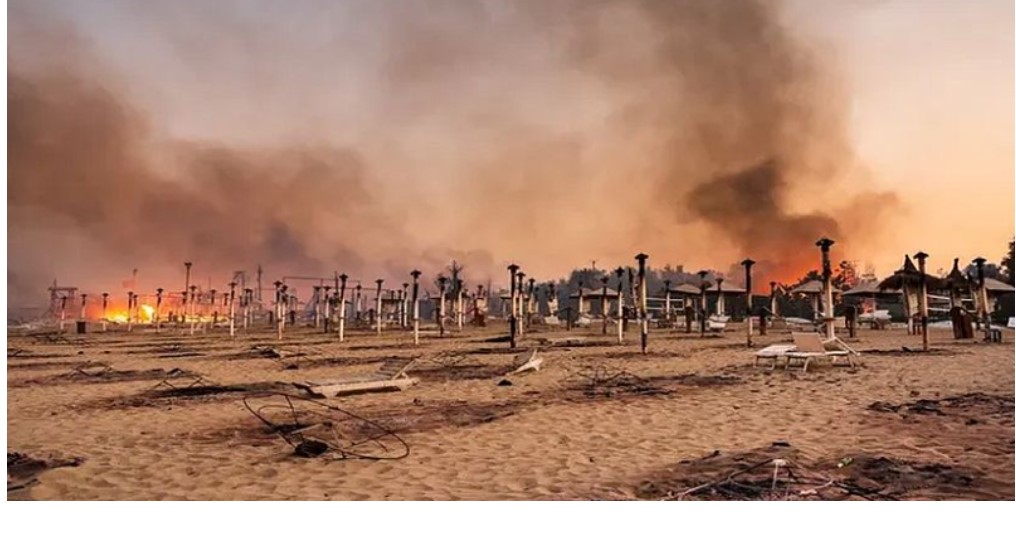Wildfires scorching some of Turkey’s most popular destinations have upended a nascent recovery in the country’s tourism sector hobbled for more than a year by the COVID-19 pandemic.
Scenes of happy beachgoers flocking to coastal areas turned nightmarish as fires forced mass-evacuations of tourists and locals alike in cities such as Bodrum and Marmaris.
Tuesday marked the seventh consecutive day Turkish firefighters battled the blazes, fueled by abnormally high summer temperatures and strong winds. The fires have been blamed for at least eight deaths and forced numerous residents, many of them farmers, to flee.
Beyond physical destruction, the economic impact is already costly.
“We are devastated,” said Huseyin Aydin of Bordum Tour, a travel agency that books boating excursions in the Mediterranean Sea. “All the routes for the boat tours have been canceled as of now, and they will also be canceled into next year because all the nature sightseeing parts of our tours are completely burned.”
Aydin told VOA his business will have to shift to other tourist ventures or risk shutting completely.
Elsewhere in the country, things look less grim.
In Istanbul, crowds of tourists can be seen strolling the streets after the Turkish government lifted almost all pandemic-related restrictions to boost economic activity and stimulate the country’s vital tourism sector.
“It’s been an overwhelmingly positive experience,” said Tania Nel, a resident of Qatar who has spent almost a month traveling Turkey.
“It was a country that I could enter easily, with just a PCR [COVID test], and obtain a visa for online. I’ve always wanted to see Turkey and, with other countries being closed, it seemed like a very obvious choice,” she told VOA. “Things being comparatively cheap here also meant I could stay longer and see quite a lot of regions in the country.”
Turkey sought to remain an international tourist destination throughout the pandemic, requiring only a negative COVID-19 test to enter the country and exempting foreigners from some restrictions, such as curfews and travel limitations within the country. Nel said ease of access drew her to Turkey.
“I had originally planned to travel to South Africa in July to see my family, but they experienced a spike in cases and stricter restrictions, hence the decision to come to Turkey,” Nel said, who is originally from Cape Town, South Africa.
Lagging recovery
Turkey’s Ministry of Culture and Tourism says incoming foreigners in June of this year barely topped 2 million, less than half the total recorded in June 2019 which saw over 5 million foreign visitors.
That hits especially hard in Turkey, where tourism is a key contributor to the national economy. The Organization for Economic Development and Cooperation describes Turkey’s tourism economy as “one of Turkey’s most dynamic and fastest growing sectors,” accounting for more than two million jobs and more than 7% of total employment.
WATCH: Is Turkey Safe for Tourism?
Arriving tourists report receiving especially warm greetings by cash-strapped hospitality workers.
“They welcomed all tourists like royalty,” Nel said.
Low tourism levels have capped the economic stimulation usually expected during the summer. Many businesses report continued and intense financial hardship.
“We are in a really hard time economically at the moment,” said Turgay Karahan, who owns two gift shops in an area of Istanbul frequented by tourists.
A lack of customers forced Karahan to let employees go and work longer hours for a fraction of pre-pandemic earnings.
“We’re working more but we’re also earning less. Most of the money we make is spent on taxes and rent. Therefore, as an employer I am in a very hard spot,” Karahan told VOA.
Numerous cafes, restaurants, and bars in Istanbul and elsewhere have permanently closed since the pandemic first struck.
Karahan spoke wistfully of the throngs of tourists that used to pack into his gift shops.
“In the past, Turks felt like foreigners on this street because so many international tourists were here. Before the pandemic, you’d see tourists from England, Germany, France, Italy all crowding the streets in the summer. Nowadays, it’s not like this at all,” he said.
Lost earnings
The financial pain is also felt by Kuzey Yucehan, who owns a restaurant around the corner from Galata Tower, a top Istanbul tourist attraction.
“For months we were only operating for takeaway [orders], but the business that brought was not sustainable. Because of that, we have many problems with making ends meet and being profitable,” Yucehan told VOA, adding that many businesses have had to fend for themselves.
“Although in the media the government presented themselves as helpful and generous toward businesses in Turkey, we did not receive any financial relief as an independent business,” Yucehan said. “We hope that COVID passes and the world will get back to normal soon.”
Follow our English language YouTube videos @ REAL TURKEY: https://www.youtube.com/channel/UCKpFJB4GFiNkhmpVZQ_d9Rg
And content at Twitter: @AtillaEng
Facebook: Real Turkey Channel: https://www.facebook.com/realturkeychannel/
